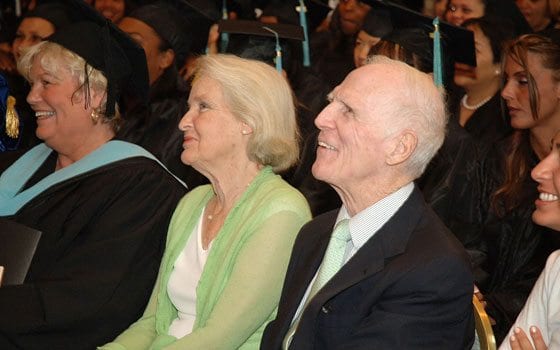
In the shadows of Faneuil Hall, there is a statue today of Kevin Hagan White, a four-term Mayor of Boston. It stands 10 feet tall, larger than life.
There really could not be a more fitting tribute to a mayor and a man who was himself a huge figure in the history of Boston. His passing gives Boston and its people a chance to reflect on how one leader, one politician, could help to reshape a major city in America.
White was elected to City Hall in 1967, a time when big city mayors in America were political forces. But in Boston, White represented a new generation of urban leaders. He was only 38 years old, filled with optimism and energy and clear ideas of what he wanted Boston to be.
And he attracted brilliant, idealistic young people to help him — brilliant young people like George Regan, Barney Frank, Micho Spring, Ann Lewis, Paul Grogan, Fred Salvucci, Robert Kiley, Bo Holland, Cecily Nuzzo Foster, Dennis Austin and Clarence “Jeep” Jones.
When White moved into City Hall, some people assumed they were getting a “business as usual” mayor — Irish and Catholic, typical and traditional. But the times were changing.
White opened up Boston’s political system to African Americans, women, Jews and gay Americans alike. He decentralized the city government by forming “Little City Halls” in the neighborhoods. He made jobs for young people a priority. He refused to let Interstate 95 run right through the city in order to protect low-income homes and boost public transportation.
But perhaps most importantly, he sparked a downtown renaissance that began with Quincy Market, now one of the city’s top tourist attractions, and it became the heartbeat of the “New Boston.”
White was the right man for the job, as he proved so poignantly, within months of taking office — April 5th, 1968, the day after Dr. Martin Luther King Jr. was assassinated.
James Brown was scheduled to do a concert at the Boston Garden that night, and rather than allow it be cancelled, as many suggested, White arranged for the concert to be televised live in hopes of minimizing unrest. He even appeared on stage himself to plead for calm.
He stood up there on the stage and he said, “All of us are here tonight to listen to a great talent,” Kevin said, “but we’re also here to pay tribute to one of the greatest of Americans — Dr. Martin Luther King Jr. Twenty-four hours ago Dr. King died for all of us, black and white, that we may live together in harmony, without violence, and in peace. I’m here to ask for your help — let’s make Dr. King’s dream a reality in Boston. No matter what any other community might do, we in Boston will honor Dr. King in peace.”
That was leadership, and it helped. Cities across the country exploded, but Boston summoned relative restraint. James Brown called Kevin “a swinging cat.”
Of course, difficult times lay ahead, a turbulent period of racial strife. White did his best to hold the city together, walking the streets, by reaching out, fighting with every ounce to get Boston where it is today. At one point he led a march of 30,000 people to protest racial violence.
White was, according to his most famous campaign slogan, “a loner in love with the city.” But he was, above all, a family man, devoted to his wife of 55 years, Kathryn, to his five children and to his seven grandchildren.
The devotion of Kevin’s family was boundless throughout his long valiant fight against Alzheimer’s disease. They gave him all the love and care he needed to face his debilitating challenge with the same dignity and courage with which he served the city of Boston for so long.
Excerpted from U.S. Sen. John Kerry’s speech on the floor of the United States Senate.






